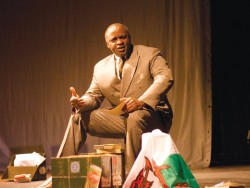 COINCIDENTALLY, I had just finished reading a glowing review in The Times of the musical Showboat, which has been revived at the Crucible Theatre in Sheffield, when the opportunity to see Call Mr. Robeson arose.
COINCIDENTALLY, I had just finished reading a glowing review in The Times of the musical Showboat, which has been revived at the Crucible Theatre in Sheffield, when the opportunity to see Call Mr. Robeson arose.
Showboat features such timeless songs as Can’t Help Lovin’ Dat Man of Mine and Bill as well as Ol’ Man River of course, and it was the 1936 film version of the show that actually rocketed Paul Robeson to fame.
Showboat is, in itself, an intensely political piece of music theatre, but that is as nothing when compared with this roller-coaster journey through Robeson’s own remarkable life. Devised and performed by Nigerian born Tayo Aluko and directed by Olusola Oyeleye, this 90 minute one-man show, described by one reviewer as a history lesson delivered as art, has toured the world to critical acclaim.
Aluko is clearly a political animal and, when not performing, lectures on such topics as West African history and the black resistance movement as well as on Paul Robeson himself. In fact, it is evident that he believes so completely in the message of the piece that, on many occasions, it became pretty well impossible to separate performer from character, something that, curiously enough, became even more apparent in the question-and-answer session that followed the show itself. Never other than totally convincing, Aluko was accompanied throughout by Phil Blandford on the piano, whose easy, relaxed style was a joy to listen to. However, from the outset, when Aluko begins to sing Ol’ Man River, making full use of the N-word, it was abundantly clear that we were not in for a light-hearted medley of Robeson’s greatest hits.
Robeson himself was born into a highly political family. Trained as a lawyer, his father was a preacher, as indeed was his brother, and from his college days he became known as a gifted orator, something that Aluko exploited to the full, as well as a formidable sportsman, six foot four inches and two hundred pounds of dark destruction. He was also blessed with one of the finest voices of his generation. But if Aluko’s baritone voice lacked some of the basso profundo of Robeson himself, there was certainly no lack of passion in his singing – the songs themselves being well chosen, the use of the negro spirituals in particular heightening the emotion and delivering a punch without any sense of artificiality.
From the very beginning, Robeson was an inveterate campaigner for working people, be they black or white. “The artist must take sides” he declared at a rally at the Royal Albert Hall in London, a phrase that still rings true today. Inevitably, it was his radical, uncompromising views, his backing and respect for the Welsh miners for example, his open admiration of the Russian political system and his tireless campaigning on behalf of what was later to become known as the American Civil Rights Movement that eventually got him into severe trouble with the American establishment. Due, in part at least, to some deliberately dishonest reporting – one newspaper declared him to be the epitome of the communist threat – and at a time when serious physical and emotional stress threatened to push him over the edge, he was summoned to appear before the House Un-American Activities Committee. This scene, making particularly effective use of recorded voices, atmospheric lighting and a few well-chosen props, was one of the many highlights, the audience being well and truly swept along with the intensity of Aluko’s compelling and commanding performance.
If all this sounds rather heavy and worthy, however, I must make it clear that at no time did we feel we were being lectured at. Tayo Aluko is, above all, an entertainer, and entertain us he most surely did. There was no shortage of humour and fine singing, and as piece of theatre it was both moving and informative – the whole working beautifully from start to finish.
Paul Robeson’s story is, without doubt, a story worth telling, and I was surely not alone in leaving the theatre really inspired to learn more, for it is a sad fact that much of what he fought for still needs fighting for today. This month marks the 40h anniversary of Robeson’s death, an event that I sincerely hope is celebrated with something akin to the weight it deserves.
DG